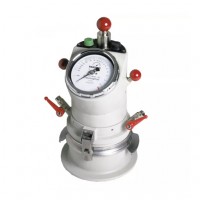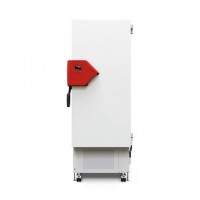Pressure Aging Vessel PAV
The Pressure Aging Vessel (PAV) has been developed to simulate the in-service aging of asphalt binder after 5 to 10 years. The binder is exposed to high pressure and temperature for 20 or 65 hours (selectable up to 99) to simulate the effect of long-term oxidative aging.
The aging of asphalt binders during service is affected by ambient temperature and by mixture-associated variables, such as component proportions in the mix, aggregate properties, and many more. This conditioning process is intended to provide an evaluation of the relative resistance of asphalt binders to oxidative aging at selected elevated temperatures and pressures. It is normally performed after initial short-term conditioning using a Rolling Thin Film Oven (RTFOT). Residue from this conditioning practice may be used to estimate the physical and chemical properties of asphalt binders after several years of in-service aging in the field and to compare these properties to pre-conditioning test results of the same binder.
The Pressure Aging Vessel PAV can be used as part of your Superpave performance-based testing program.
The apparatus consists of a stainless steel (AISI 304 with ASME and CE certifications) pressure vessel with encased band heaters and internal pressure and temperature controls. Data logs of both temperature and pressure are saved on a USB stick or transferred to a PC at the end of the test. The user-friendly software allows the operator to view the vessel temperature and pressure in real-time, both asset targets and actual values, with a high rate of refresh. It is also possible to view, in real-time, the temperature and pressure graphs.
The instrument features PID temperature control and highly efficient heaters that allow heating rate and temperature control to exceed the Standards’ specifications. Pre-heating of the instrument can be programmed to allow the operator to find the PAV ready for the next test at any time. An acoustic alarm advises the operator when the test is finished.
The PAV requires a suitable compressed air tank with, 2.1Mpa minimum pressure. This could be for example an air compressor or commercial bottled air, depending on reference standards.
Features
- Platinum RTD temperature internal measurement to +/- 0.1° C
- Freely selectable test temperatures from 80° to 120°C, PID controlled to +/- 0.5°C
- Efficient heating system allowing the test temperature to be achieved in one hour, exceeding the Standards’ specification
- Programmable pre-heating functions (limited to 60° C to avoid accidental burns during sample rack positioning) for time optimization
- Pressure monitored by transducer and controlled to 2.1 +/- 0.1 MPa
- User friendly software allows real time readout of vessel temperature and pressure
- 6″ colour touch screen reclinable display
- Temperature and pressure calibrations performable by the user
- CE and ASME certified pressure vessel
- Electrically locked top cover, to avoid direct exposure of the pressure vessel during the test
- Forced ventilation cooling system allowing quick cooling of sample rack to avoid accidental burn
- Over temperature limit switch
- Over pressure relief valve
Specifications
- Working temperature range: 80 to 120° C
- Temperature measurement: Platinum RDT with +/- 0.1 resolution
- Testing time: up to 99 hours
- Power: 1000 W
- Dimensions, mm (l x l x h): 430 x 660 x 480
- Weight: 90 kg approx.
Model
81-PV2600/Z
Pressure Aging Vessel (PAV) conforming to ASTM D6521, AASHTO R28, EN 14769. 110V, 60 Hz, 1 ph.




Do you have a question?
min 10 ch